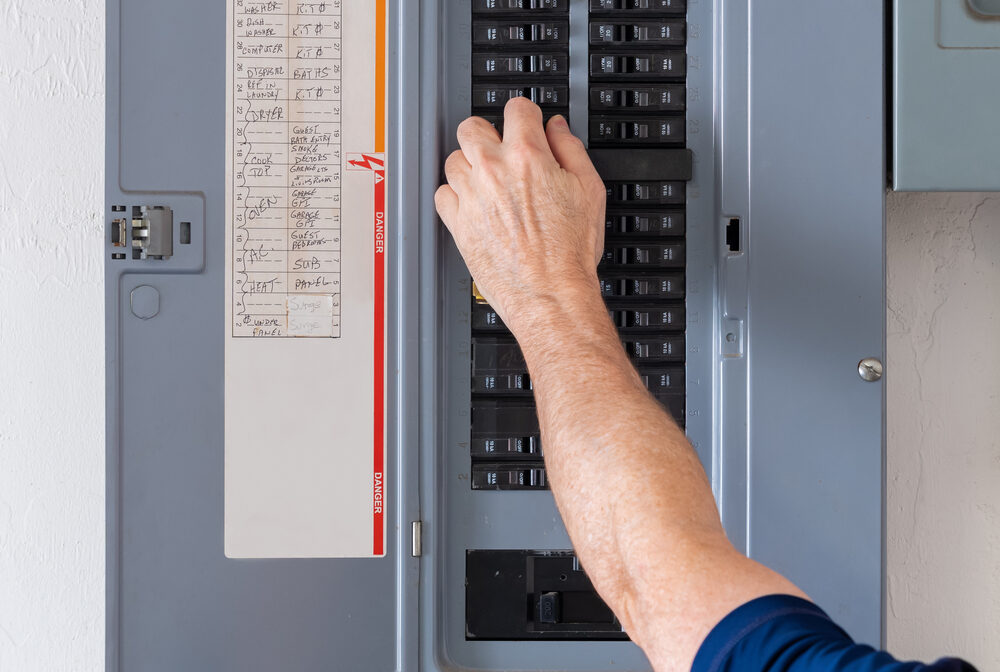Need an Electrical Panel Upgrade for Solar?
Wondering whether you need to upgrade your electrical panel before jumping into the world of solar energy? A lot of homeowners scratch their heads over this one when they’re thinking about making a change. The truth is, the readiness of your home’s electrical system plays a crucial role in harnessing solar power efficiently. Not all homes are equipped out-of-the-box to handle modern solar installations – especially older properties or those not designed with renewable energy considerations in mind.
Before we get into it, QG Smart Home is fully insured electrician in Bucks County and surrounding area. If you are looking to upgrade your electrical panel for solar panels, give us a call for a free estimate.
Your journey towards sustainable energy starts here, as we explore why assessing and possibly upgrading your electric panel could be key to unlocking full solar potential without hitches.
Understanding Your Home’s Electrical Panel and Solar Compatibility
What is an Electrical Panel?
Your home’s electrical panel is like the heart of your electrical system. It’s the central hub that distributes electricity to all your appliances and devices.
Think of it as a control center that manages the flow of power throughout your home. Without it, your fridge wouldn’t cool, your lights wouldn’t shine, and your TV would be nothing more than a fancy paperweight.
How Solar Panels Affect Your Electrical System
Now, let’s throw solar panels into the mix. These marvels of technology harness the power of the sun and convert it into electricity for your home. Think of it as your very own little power station, right there on your roof.
But here’s the thing: that solar energy needs to flow through your electrical panel to reach your appliances. It’s like adding a new source of power to the grid, and your panel needs to be able to handle it.
Assessing Your Current Electrical Load
So, before you hop on board with solar energy, it’s a smart move to take a close look at your current electrical usage. Take a look at all the appliances and devices you have running in your home. Each one has its own electrical demand, measured in watts.
For example, a refrigerator might need around 100-200 watts, while a microwave can consume about 1000 watts. Add up all these demands, and you’ll get an idea of how much electricity your home needs at any given time.
Now, compare that to the capacity of your electrical panel, usually rated in amps (like 100A, 150A, or 200A). If your panel is already close to its limit with your current load, adding solar panels might push it over the edge.
Signs You Need an Electrical Panel Upgrade for Solar Installation
Age of Your Current Panel
If your home is older, chances are your electrical panel might be too. Older panels weren’t designed with solar in mind, and they might not have the capacity to handle the extra power flow.
If your panel is more than 20-25 years old, it’s probably time for an upgrade. Newer panels are built to accommodate the demands of modern living, including solar energy.
Capacity and Safety Concerns
Even if your panel isn’t ancient, it might still be undersized for your needs. If you’ve added new appliances or expanded your home over the years, your electrical demand has likely increased.
An overloaded panel is a safety hazard. It can lead to electrical fires, short circuits, and other dangerous situations. If your panel is showing signs of strain, like frequent breaker trips or buzzing sounds, it’s time for an upgrade.
The Impact of Adding Solar Panels
Solar panels can generate a significant amount of power, especially if you have a larger system. All that extra electricity flowing into your panel can be the straw that breaks the camel’s back, so to speak.
If your panel is already at or near capacity, the additional load from solar can cause overloaded circuits, tripped breakers, and even damage to your appliances. It’s like trying to fit too much water through a small pipe – eventually, something’s going to burst.
The Process and Benefits of Upgrading Your Electrical Panel for Solar
Steps to Upgrade Your Electric Panel
Upgrading your electrical panel isn’t a DIY job. Honestly, tackling this needs the know-how of a pro electrician. Here’s a general overview of the steps involved:
- Consultation: An electrician will assess your current panel and electrical load to determine the size and type of panel you need.
- Permits: Your electrician will obtain the necessary permits from your local building department.
- Installation: The old panel is removed, and the new one is installed. This may involve rewiring and rerouting electrical lines.
- Inspection: Before we wrap up, a final check is done to make sure the new panel passes all the safety checks and measures up.
How a New Panel Supports Larger Solar Systems and EV Chargers
A new, upgraded electrical panel doesn’t just accommodate solar panels. Plus, this smart move sets your home up nicely for any future electrical additions you might consider, like popping in a charger for an electric vehicle.
As more people switch to EVs, home charging stations are becoming increasingly common. These chargers require a dedicated circuit and can draw a significant amount of power. With an upgraded panel, you’ll have the capacity to install an EV charger without overloading your system.
Enhancing Energy Efficiency and Lowering Bills
An upgraded electrical panel, combined with solar energy, can significantly enhance your home’s energy efficiency. Solar panels generate clean, renewable electricity, reducing your reliance on the grid.
This not only lowers your carbon footprint but also translates to lower energy bills. In some cases, you might even generate more electricity than you use, allowing you to sell the excess back to the grid for a credit.
Navigating Local Building Codes and Utility Requirements for Solar Panels
Understanding Building Codes Related to Solar Installations
Before you can install solar panels and upgrade your electrical panel, you’ll need to navigate the labyrinth of local building codes and regulations. These codes ensure that your installation is safe, efficient, and compliant.
Some common building code requirements for solar include:
- Structural requirements: Your roof must be able to support the weight of the solar panels.
- Electrical requirements: Your panel must meet certain specifications, like amperage and voltage.
- Fire safety requirements: There must be clear access for firefighters to navigate around the panels in case of an emergency.
Working with Utility Companies for Grid Connection
In addition to building codes, you’ll also need to work with your local utility company to connect your solar system to the grid. This process, known as interconnection, allows you to draw power from the grid when your panels aren’t producing enough, and to send excess power back to the grid when you’re producing more than you need.
Your utility company will have specific requirements for interconnection, including:
- Application process: You’ll need to submit an application and receive approval before connecting to the grid.
- Equipment requirements: Your solar system and electrical panel must meet the utility’s specifications for safety and compatibility.
- Metering: You may need to install a special meter that tracks the flow of electricity in both directions.
Navigating these codes and requirements can be complex, but a knowledgeable solar installer can guide you through the process. They’ll handle the paperwork, permits, and inspections, ensuring that your installation is compliant and connected.
Before going solar, check your electrical panel’s age and capacity. Older or overloaded panels need an upgrade for safety and to handle the extra power from solar. Upgrading not only supports solar but also future-proofs for EV chargers, boosts energy efficiency, and lowers bills.
Financial Considerations of an Electrical Panel Upgrade for Solar Energy Use
Let’s talk money. Upgrading your electrical panel for solar power isn’t just about the technical stuff – it’s also about the financial side of things.
Two key factors come into play here: the cost of the upgrade itself and the potential tax incentives and rebates you could get for going solar.
Estimating the Cost of an Electric Service Panel Upgrade
So, how much is this going to set you back? Well, the cost of upgrading your electric panel can vary quite a bit.
The cost really boils down to how big your place is, the nuts and bolts of getting it installed, and your zip code.
On average, you can expect to shell out anywhere from $500 to $2,500 for a panel upgrade. I know, it’s not pocket change.
But here’s the thing – in many cases, the electric panel upgrade or new installation may be one of the most costly parts of an overall solar system installation project.
However, it also enables the entire system to function properly and affords additional benefits as well.
Think of it like this: you’re not just paying for the panel itself, you’re investing in the foundation that’s going to make your whole solar setup work like a charm.
Tax Incentives and Rebates for Going Solar
Now, here’s the good news. When you decide to go solar, Uncle Sam actually wants to give you a pat on the back – in the form of some pretty sweet tax incentives and rebates.
One of the biggest ones is the Federal Solar Income Tax Credit. This bad boy was just increased to 30% of the total cost of your solar system.
That’s right, a tax credit is a dollar-for-dollar reduction in income taxes owed to the federal government. It’s like getting a big discount on your solar setup.
But wait, there’s more. Many states, local governments, and even some utility companies offer additional incentives for going solar.
You might find yourself happily surprised by some of the perks available, including cash back in your pocket, breaks on property taxes, and rewards that grow with how well you perform.
For example, California’s Self-Generation Incentive Program provides rebates for installing solar battery storage systems.
The amount of these incentives can vary widely depending on where you live, but they can significantly reduce the overall cost of your solar installation.
Frequently Asked Questions:
- How much does it typically cost to upgrade an electrical panel for solar?The cost of upgrading an electrical panel for solar can vary, but on average, it ranges from $500 to $2,500. The exact cost depends on factors like the size of your home, the complexity of the installation, and your location.
- Are there any tax incentives or rebates available for upgrading my panel for solar?
Yes. The Federal Solar Income Tax Credit allows you to deduct 30% of the cost of installing a solar energy system from your federal taxes. Additionally, many states, local governments, and utility companies offer their own incentives, such as cash rebates or property tax exemptions. - Can I include the cost of the panel upgrade when claiming the Federal Solar Tax Credit?Yes, you can. The cost of upgrading your electrical panel can be included in the total cost of your solar installation when claiming the 30% Federal Solar Income Tax Credit.
- Are the incentives the same in every state?No, incentives can vary significantly from state to state and even from one utility company to another. It’s best to check with your local government and utility provider to see what specific incentives are available in your area.
- How can I find out more about the incentives available in my area?The best place to start is with your state’s energy office or your local utility company. On top of helping you pick out the perfect solar setup, many companies are happy to clue you in on any sweet deals or incentives available where you live.
Remember, while the upfront cost of a panel upgrade might seem daunting, the long-term financial benefits of solar energy can be substantial.
With the right incentives and the energy savings over time, upgrading your electrical panel for solar can be a smart investment in your home and your future.
Upgrading your electrical panel for solar is an investment, not just a cost. You’ll pay upfront but save big with tax credits and rebates. It’s all about laying the right foundation for savings and efficiency in your solar journey.
Conclusion
The journey through understanding if do I need to upgrade my electrical panel for solar ends not just with clarity but also empowerment. You’ve walked through signs indicating a necessary update and discovered how this step can enhance both safety and efficiency within your home’s embrace of renewable energy.
This isn’t merely about meeting technical requirements; it’s about embracing change wisely, ensuring every component in our life aligns perfectly like pieces in a puzzle toward sustainability—our collective future depends on these mindful steps forward. So let me leave you with this thought: while AI might shape content creation or simplify chores around the house, at heart it serves us best when enhancing human efforts towards smarter living choices—including deciding on upgrades essential for integrating clean energy solutions like solar power seamlessly into our lives. No matter if you are looking for panel upgrades, smart home upgrades or generator installation in Montgomery County, PA, QG Smart Home can help you with all of your electrical needs.








